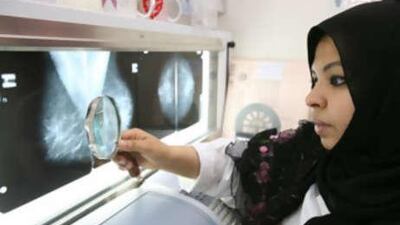ABU DHABI // Women are being diagnosed with breast cancer in their teens and 20s, in one case as young as 17, highlighting a need for greater awareness of the disease at an early age, say health professionals. A leading expert has revealed that there are more cases of breast cancer among younger women in the UAE than in other parts of the world. Along with the 17-year-old, a woman of 19 was diagnosed with a disease more commonly associated with women in their 50s.
Late diagnosis often leaves women with little chance of a cure and doctors are calling for campaigns to alert schoolgirls and young women to the danger. Women, afraid of the stigma still attached to breast cancer in Gulf states, often ignore warning signs and are reluctant to examine themselves. Younger women remain largely ignorant of the need to be aware of the disease from an early age. Dr Rawda al Mutawa, who was involved in the recent Break The Silence campaign, part of the Global Initiative for Breast Cancer Awareness, said: "Throughout the campaign and during the checks we performed on the younger women, many younger people were diagnosed with cancer who had no idea at all, including a 17-year-old."
Dr Mutawa, the president of the Emirate's Business Women Council and chief executive of the council's Abu Dhabi branch, said lack of information was a problem. "The problem with young people is that they consider this to be an illness that afflicts older women only," she said, "so they do not heed the advice and warnings. "During the campaign, we went to secondary schools. Each day, we had 10 or 15 girls going to the hospitals to get mammograms, so they learnt about the importance of these self-examinations."
Between 2003 and 2006, almost as many women were diagnosed with breast cancer as with all the other types of cancer combined, according to the National Cancer Registry. The disease accounts for 22.8 per cent of the total number of diagnosed cases of cancer in the UAE, making it the country's most common cancer. The young age at which women are developing breast cancer is of increasing concern to doctors.
"The breast cancer in the UAE is very special," said one expert, who has been involved in screening women for more than 10 years. "We have a lot of younger cases and most of them are caught only at a late stage." The average age at which breast cancer was diagnosed among Emiratis was between 40 and 45, she said, which was 10 years younger than in Europe. "Of course we get even younger cases, in their 20s and 30s, and we have had patients as young as 17 and 19."
The national screening centre for women and children was officially opened in the capital a week ago. Its major tasks include educating people about the importance of self-examination at an early age, and overcoming taboos. Encouraging women to self-examine, especially younger women, was not an easy task, said Dr Mutawa, but it was a vital one: "In the campaign, we focused specifically on girls who had a family history of breast cancer.
"Many people do not realise the hereditary element of the illness and we needed to make them realise the situation." It is estimated that only 30 per cent of women with breast cancer in the country are diagnosed in the early stages of the disease, when the chances of a cure are higher. Dr Miriam al Otaiba, a senior doctor at the Makkah Specialised Medical Centre in Abu Dhabi, said the subject of breast cancer and self-examination was not always raised by doctors, as patients did not always welcome advice on the disease.
"Traditionally speaking, it would be odd for me to just ask the patient to examine her breasts without any complaint or request," she said. "The patient would not think it was normal. "However, we do advise and strongly encourage all patients to take certain precautions." @Email:munderwood@thenational.ae @Email:amcmeans@thenational.ae With additional reporting by Hessa al Romaithi and Fatima al Shamsi

